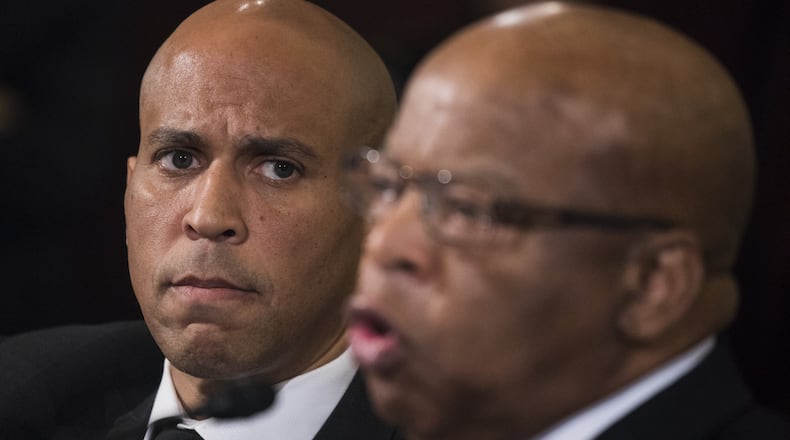In times like these, we wonder who will carry forward the torch of great leaders who changed our nation’s history. For many Atlantans and Americans nationwide, Rep. John Lewis represented the conscience of Congress and a living link to our civil rights history.
He famously said: “Do not get lost in a sea of despair. Be hopeful, be optimistic. Our struggle is not the struggle of a day, a week, a month or a year; it is the struggle of a lifetime. Never, ever be afraid to make some noise and get in good trouble, necessary trouble.”
With Lewis’ passing five years ago, we lost a moral compass. But in the halls of the Senate recently, Sen. Cory Booker admired Lewis and embodied his spirit of principled activism. He has answered Lewis’ call to get into “good trouble, necessary trouble.”
A legacy that inspires
Lewis’ commitment to fairness, justice and human dignity defined his life’s work. What we are experiencing today is the opposite of that. We are seeing people dehumanized. We are seeing our brothers and sisters treated unjustly and without kindness. This is what Lewis fought against his entire life.
He taught us that standing up for what is right often requires putting your body on the line for your beliefs. His message has resonated across generations, inspiring people who never experienced the civil rights era to take up a cause of their own.
The importance of preparation
From the Nashville sit-ins to the Edmund Pettus Bridge and in the halls of Congress, Lewis demonstrated that preparation and courage could move mountains. For example, he and his fellow students at American Baptist Theological Seminary studied nonviolence under the Rev. Jim Lawson for a full year before stepping up to those lunch counters in Nashville. They were fully prepared for what was to come.
Booker’s 25-hour filibuster was not just a political maneuver — it was a deliberate channeling of John Lewis’ spirit. Like Lewis before him, Booker prepared thoroughly, understanding that effective activism requires both passion and strategy.
Similarly, Booker started preparing for his speech several years ago. Standing while Sen. Chris Murphy spoke for nearly 15 hours in a filibuster on gun control in 2016 was part of his preparation. In the days leading up to his speech, Booker fasted and curbed his water intake. He was preparing to meet the moment.
Lewis had a remarkable ability to inspire action through even the briefest of encounters. His influence continues to be felt today, as evident in last week’s rallies across the nation and social media where his calls for “good trouble” echo among activists young and not-so-young.
A special relationship
Lewis’ relationship with Booker was special. Booker has often spoken of Lewis as a mentor whose example shaped his approach to public service.
In 2013, on the day of Booker’s swearing-in to the U.S. Senate, Lewis hosted breakfast for the incoming senator and his mother in his office.
In 2016, Lewis used House procedures and organized a sit-in along with his colleagues on the floor of the U.S. House of Representatives to take a powerful stand on gun control, using the tools available to him as a member of Congress.
In 2017, Booker and Lewis conducted a livestream sit-in on the Capitol steps as Republicans were trying to repeal the Affordable Care Act.
These intentional moments of connection and peaceful nonviolent demonstration were surely on Booker’s mind as he planned and prepared for his speech.
Standing tall
During his marathon stand, Booker invoked Lewis memory: “There is something going wrong in America today, where people are not treated fairly, not treated justly, not treated equally. This is precisely the kind of moment when Congressman Lewis would have us speak up and stand up.”
Booker reminded his colleagues: “John Lewis taught us that silence in the face of injustice is complicity. Today, I’m choosing to follow his example.”
Booker has said that in many ways, Rep. Lewis was the “ancestor I was leaning on the most” and that he “stood on the shoulders of a generation who lived during segregation and lynching and all kinds of shameful bigotry.”
Your turn for ‘good trouble’
The true measure of Lewis’ and Booker’s impact is not what they accomplished themselves but what they inspired others to do.
What the nation could use more of at this time is thousands of individual voices standing up and speaking out — getting into “good trouble, necessary trouble.”
Booker closed his speech by saying: “(Representative) Lewis said for us to go out and cause some good trouble, necessary trouble, to redeem the soul of our nation … Let us be bolder in America with a vision that inspires, with hope that starts with the people of the United States of America.”
In times like these, we must seek to be inspired, to speak up and speak out. This is what this moment demands of us. When historians look back on this period, will you be able to say you stood up and made your voice heard?
Credit: Detria Austin Everson/contributed
Credit: Detria Austin Everson/contributed
Credit: Michael Collins/contributed
Credit: Michael Collins/contributed
Michael Collins is board chair of the John and Lillian Miles Lewis Foundation and former chief of staff for Congressman John Lewis.
Detria Austin Everson is president and CEO of the John and Lillian Miles Lewis Foundation.
About the Author
Keep Reading
The Latest
Featured




